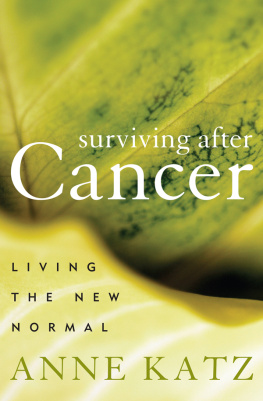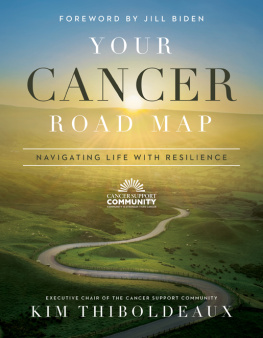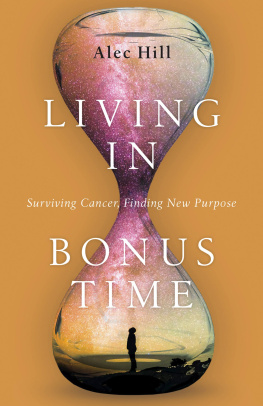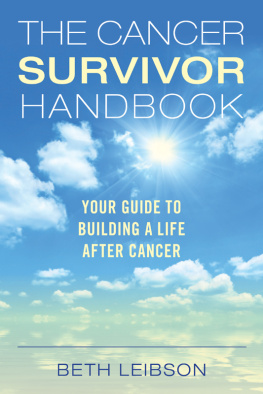Surviving After Cancer
Surviving After Cancer
Living the New Normal
Anne Katz
ROWMAN & LITTLEFIELD PUBLISHERS, INC.
Lanham Boulder New York Toronto Plymouth, UK
Published by Rowman & Littlefield Publishers, Inc.
A wholly owned subsidiary of The Rowman & Littlefield Publishing Group, Inc.
4501 Forbes Boulevard, Suite 200, Lanham, Maryland 20706
http://www.rowmanlittlefield.com
Estover Road, Plymouth PL6 7PY, United Kingdom
Copyright 2011 by Rowman & Littlefield Publishers, Inc.
All rights reserved . No part of this book may be reproduced in any form or by any electronic or mechanical means, including information storage and retrieval systems, without written permission from the publisher, except by a reviewer who may quote passages in a review.
British Library Cataloguing in Publication Information Available
Library of Congress Cataloging-in-Publication Data
Katz, Anne.
Surviving after cancer : living the new normal / Anne Katz.
p. cm.
Includes bibliographical references and index.
ISBN 978-1-4422-0365-5 (cloth : alk. paper) ISBN 978-1-4422-0367-9 (electronic)
1. CancerPopular works. 2. CancerPatientsPopular works. I. Title.
RC263.K277 2011
616.99'4dc22 2010043444
 The paper used in this publication meets the minimum requirements of
The paper used in this publication meets the minimum requirements of
American National Standard for Information SciencesPermanence of Paper
for Printed Library Materials, ANSI/NISO Z39.48-1992.
Printed in the United States of America
Always, Alan
Part I
What Is the New Normal?
C ancer survivor. What does that mean? How do you know if you are one? Is there some magical sign that heralds your arrival at a place youve never been before? How does it feel? Are your worries over? Will side effects of treatment magically disappear and life go back to what it was before? This chapter sets the stage for the rest of the book by explaining this new phase of the cancer journey and by identifying common challenges for the years of healthy living that hopefully lie ahead.
Cancer survivorship is a relatively new term for a distinct phase of the cancer experience. A report from the Presidents Cancer Panel in 2004 attempted to define this term:
Among health professionals, people with a cancer history, and the public, views differ as to when a person with cancer becomes a survivor. Many consider a person to be a survivor from the moment of diagnosis; in recent years, this view has become increasingly prevalent. Some, however, think that a person with a cancer diagnosis cannot be considered a survivor until he or she completes initial treatment. Others believe a person with cancer can be considered a survivor if he or she lives 5 years beyond diagnosis. Still others believe survivorship begins at some other point after diagnosis and treatment, and some reject the term survivor entirely, preferring to think of people with a cancer history as fighters, thrivers, champions, patients, or simply as individuals who have had a life-threatening disease. A considerable number of people with a cancer history maintain that they will have survived cancer if they die from another cause.
There are other ways of looking at survivorship. The Office of Cancer Survivorship at the National Cancer Institutes states their definition in the following manner: An individual is considered a cancer survivor from the time of diagnosis, through the balance of his or her life. Family members, friends, and caregivers are also impacted by the survivorship experience and are therefore included in this definition. However, the Office of Cancer Survivorship decided to focus its research on the period after diagnosis and treatment.
Fitzhugh Mullan, a cancer survivor and founding member of the National Coalition for Cancer Survivorship, describes three seasons of survival: the first is acute survival that begins with diagnosis and continues through active treatment. The second is that of extended survival, which begins with the termination of active treatment and a period of disease remission. The third is permanent survival or cure.
But what about those who have completed active treatment and are prescribed adjuvant treatment? Women with breast cancer fall into this category. Many will take antiestrogen medication for years following surgery, radiation, and chemotherapy. Are they survivors or still in active treatment? And what about men who are diagnosed with prostate cancer and opt for deferred treatment by following an active surveillance protocol? They dont have surgery or radiation, so are they ever regarded as survivors?
Confused? Well, so are many health care providers! Despite the confusion over terminology and definitions, there is a lot of ongoing research and service provision for people who have had cancer. Chapter 12 contains a list of organizations and their websites that provide useful information for cancer survivors and their families. There is also a list of books that you may find helpful and informative.
And what about this book? In the following nine chapters, you will read about nine individuals who have had different kinds of cancer and are facing various challenges. From my clinical experience and a detailed review of the literature, there are several issues that affect cancer survivors. The following chapters address these important issues.
In chapter 2, you will read about Nancy, a forty-five-year-old woman who was treated for breast cancer. Nancy is struggling with the fear that the cancer will come back. This fear of recurrence is common and can be debilitatingsome cancer survivors live every day with high anxiety that interferes with their ability to function. Nancy finds it difficult to ask for help in dealing with her anxiety, but she eventually finds some relief through the practice of mindfulness meditation.
Another common challenge after treatment is feeling depressed. In chapter 3, you will meet Robert, a colon cancer survivor. When his chemotherapy is over, he begins to feel depressed and hopeless. He tries to hide it from his wife, but eventually one of the nurses notices how down he is and offers him help in the form of a referral to a psychiatrist. Despite some initial resistance, Robert finds that antidepressants begin to improve his mood.
Going back to work can be a significant challenge after months of treatment. In chapter 4, you will learn how Steve, a construction worker, is able to go back to work despite some lingering side effects from prostate cancer surgery. This chapter highlights some of the legislation in place to help cancer survivors reenter the work force, as well as some of the challenges facing people in the workplace.
Fatigue is another challenge for cancer survivors. Many people assume that once treatment is over they will instantly go back to feeling normal again. Barbs story in chapter 5 illustrates some of the persistent issues for cancer survivors. Six months after completing treatment for uterine cancer, she still feels exhausted and is frustrated by her lack of energy. She is surprised when she learns that getting regular exercise will help combat the fatigue.
An often unspoken side effect of all cancer treatments is the effect on sexuality and sexual functioning. In chapter 6, you will meet Karen and Gary, who experience some fairly typical challenges after Karen goes into menopause after a stem cell transplant. The couple doesnt talk about what is happening, and they start to live separate lives. Eventually Karen goes to an information session about menopause, where she hears a sex therapist talk about some of the difficulties that couples face when hormonal changes affect their sex life.







 The paper used in this publication meets the minimum requirements of
The paper used in this publication meets the minimum requirements of